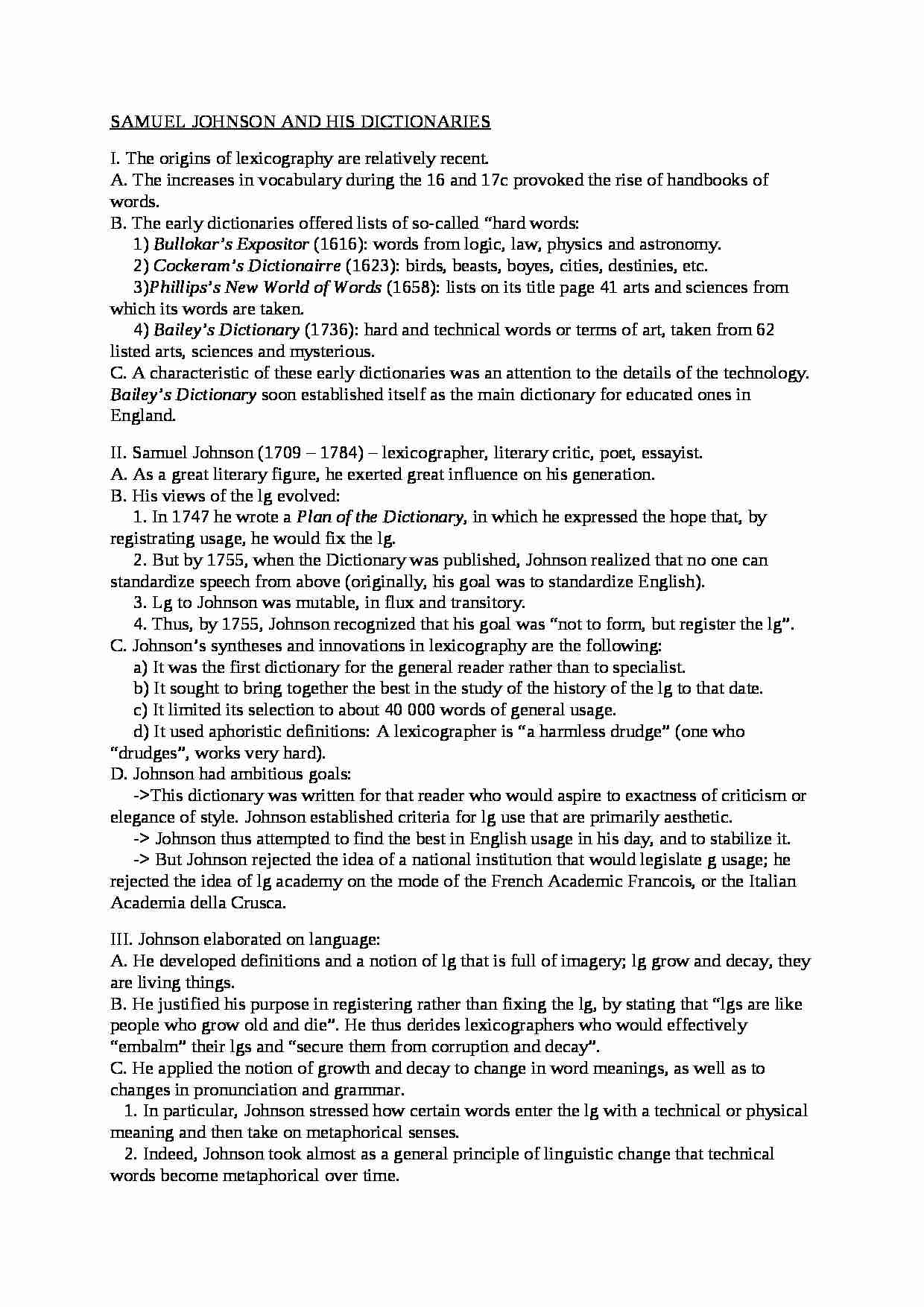To tylko jedna z 2 stron tej notatki. Zaloguj się aby zobaczyć ten dokument.
Zobacz
całą notatkę


SAMUEL JOHNSON AND HIS DICTIONARIES
I. The origins of lexicography are relatively recent. A. The increases in vocabulary during the 16 and 17c provoked the rise of handbooks of words. B. The early dictionaries offered lists of so-called “hard words: 1) Bullokar's Expositor (1616): words from logic, law, physics and astronomy. 2) Cockeram's Dictionairre (1623): birds, beasts, boyes, cities, destinies, etc. 3)Phillips's New World of Words (1658): lists on its title page 41 arts and sciences from which its words are taken. 4) Bailey's Dictionary (1736): hard and technical words or terms of art, taken from 62 listed arts, sciences and mysterious. C. A characteristic of these early dictionaries was an attention to the details of the technology. Bailey's Dictionary soon established itself as the main dictionary for educated ones in England.
II. Samuel Johnson (1709 - 1784) - lexicographer, literary critic, poet, essayist. A. As a great literary figure, he exerted great influence on his generation. B. His views of the lg evolved: 1. In 1747 he wrote a Plan of the Dictionary, in which he expressed the hope that, by registrating usage, he would fix the lg. 2. But by 1755, when the Dictionary was published, Johnson realized that no one can standardize speech from above (originally, his goal was to standardize English). 3. Lg to Johnson was mutable, in flux and transitory. 4. Thus, by 1755, Johnson recognized that his goal was “not to form, but register the lg”. C. Johnson's syntheses and innovations in lexicography are the following: a) It was the first dictionary for the general reader rather than to specialist. b) It sought to bring together the best in the study of the history of the lg to that date. c) It limited its selection to about 40 000 words of general usage. d) It used aphoristic definitions: A lexicographer is “a harmless drudge” (one who “drudges”, works very hard). D. Johnson had ambitious goals: -This dictionary was written for that reader who would aspire to exactness of criticism or elegance of style. Johnson established criteria for lg use that are primarily aesthetic. - Johnson thus attempted to find the best in English usage in his day, and to stabilize it. - But Johnson rejected the idea of a national institution that would legislate g usage; he rejected the idea of lg academy on the mode of the French Academic Francois, or the Italian Academia della Crusca.
III. Johnson elaborated on language: A. He developed definitions and a notion of lg that is full of imagery; lg grow and decay, they are living things. B. He justified his purpose in registering rather than fixing the lg, by stating that “lgs are like people who grow old and die”. He thus derides lexicographers who would effectively “embalm” their lgs and “secure them from corruption and decay”. C. He applied the notion of growth and decay to change in word meanings, as well as to changes in pronunciation and grammar.
... zobacz całą notatkę




Komentarze użytkowników (0)